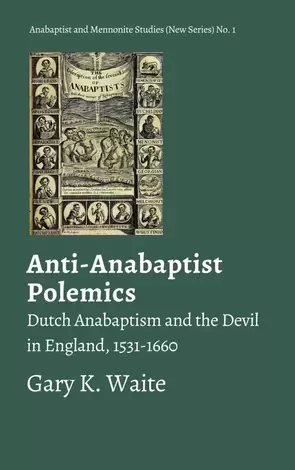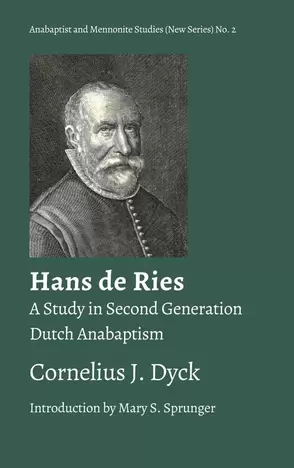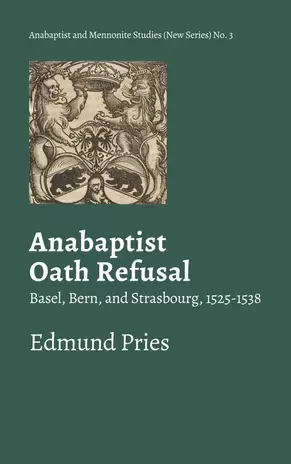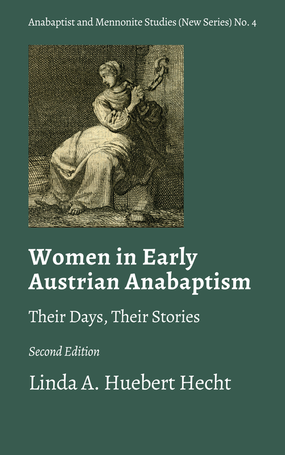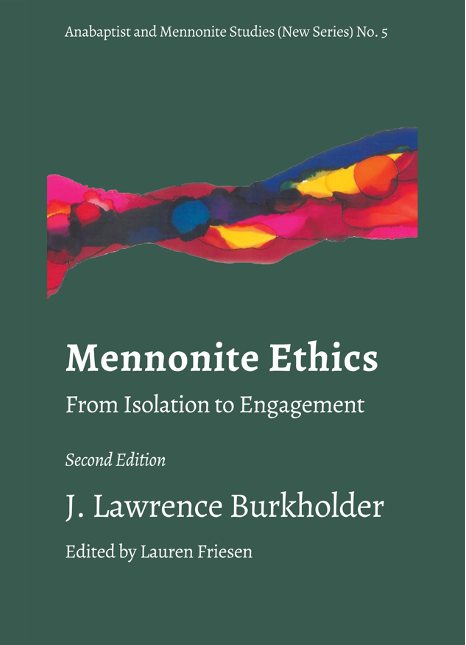Anabaptist and Mennonite Studies (New Series)
Edited by Maxwell Kennel
For details on the original 2000-2010 run of this series, please see here.
Volume 1. Gary Waite, Anti-Anabaptist Polemics: Dutch Anabaptism and the Devil in England, 1531-1660. Pandora Press, 2023. 267 pp. Order here.
Volume 2. Cornelius J. Dyck, Hans de Ries: A Study in Second Generation Dutch Anabaptism. Intro. by Mary S. Sprunger. Pandora Press, 2023. 371 pp. Order here.
Volume 3. Edmund Pries, Anabaptist Oath Refusal: Basel, Bern, and Strasbourg, 1525-1538. Pandora Press, 2023. 485 pp. Order here.
Volume 4. Linda A. Huebert Hecht, Women in Early Austrian Anabaptism: Their Days, Their Stories. 2nd Edition. Pandora Press, 2023. 350 pp. Order here.
Volume 5. J. Lawrence Burkholder, Mennonite Ethics: From Isolation to Engagement. 2nd Edition. Ed. by Lauren Friesen. Pandora Press, 2023. 550 pp. Order here.
Volume 6. The Anabaptist Lodestar: Interpretations of Anabaptism on the Eve of a 500-Year Celebration. Edited and Translated by Leonard Gross. Thunder Bay: Pandora Press, 2024. 180 pp. Order here.
Volume 2. Cornelius J. Dyck, Hans de Ries: A Study in Second Generation Dutch Anabaptism. Intro. by Mary S. Sprunger. Pandora Press, 2023. 371 pp. Order here.
Volume 3. Edmund Pries, Anabaptist Oath Refusal: Basel, Bern, and Strasbourg, 1525-1538. Pandora Press, 2023. 485 pp. Order here.
Volume 4. Linda A. Huebert Hecht, Women in Early Austrian Anabaptism: Their Days, Their Stories. 2nd Edition. Pandora Press, 2023. 350 pp. Order here.
Volume 5. J. Lawrence Burkholder, Mennonite Ethics: From Isolation to Engagement. 2nd Edition. Ed. by Lauren Friesen. Pandora Press, 2023. 550 pp. Order here.
Volume 6. The Anabaptist Lodestar: Interpretations of Anabaptism on the Eve of a 500-Year Celebration. Edited and Translated by Leonard Gross. Thunder Bay: Pandora Press, 2024. 180 pp. Order here.
Volume 1. Anti-Anabaptist Polemics: Dutch Anabaptism and the Devil in England, 1531-1660
|
Available for purchase worldwide on Amazon, and by special order through the Pandora Press contact page.
Press: See here for a recent interview on the book! "Meticulously researched and brilliantly written, this engaging and timely book opens up a fascinating and neglected subject in ways that will interest anyone who looks at religion in early modern England. Essential for those working on English Baptist history, it also offers rich new insights for researchers interested in the intersections of religion, politics, polemic, and the supernatural in the early modern world." — Dr. Andrew Crome, Senior Lecturer in Early Modern History, Manchester Metropolitan University “Gary Waite provides a fascinating and thorough overview of interpretations of Anabaptism in sixteenth- and seventeenth-century England. This book is laden with treasures from the archives and will enrich scholarly understanding of the era.” — Dr. Melody Maxwell, Associate Professor of Christian History at Acadia Divinity College and Director of the Acadia Centre for Baptist and Anabaptist Studies |
by Gary K. Waite. Thunder Bay: Pandora Press, 2023. 267 pp. ISBN-13: 978-1926599991. $39.50 CAD.
Anti-Anabaptist Polemics examines polemical works printed between 1531 (when the first known treatise on Anabaptism was printed in England) and 1660 (when the Restoration brought back royal control over religion after the Interregnum) to gauge how continental Anabaptism was understood, polemically distorted, and utilized as a weapon in the debates over religious diversity in England. In the process, Gary Waite argues that some of the weaponized elements of Dutch and German Anabaptism that were hurled about in thousands of hate-filled pamphlets and treatises over the century not only fed into fears of the devil and witchcraft, but inadvertently offered the discontented a number of innovative ideas to draw from, helping in fact to inspire the surge in new religious movements of the 1640s, even though the intention of the authors was to suppress, not encourage, dissent. Anti-Anabaptist Polemics fills significant gaps in our understanding of the development and impact of polemical publications against Anabaptism in England leading up to the Restoration. "The Anabaptists demolished the conventions of early modern Europe – in theology, in politics and in socio-economic affairs. Although few and foreign in England, their reputation for breaking with traditional ways provoked outspoken denunciation there. Gary Waite has analysed the English writers who wrote against Dutch and German Anabaptism between 1531 and 1660, bringing out their habitual concentration on the horrors of the violence, communism, and polygamy of the outbreak at Münster in 1533-35. The English polemicists were eager to blacken the image of Separatists at home by drawing spurious parallels. The effect was to arouse anxiety among adherents of the established Church of England but also, paradoxically, to give ideas to some of those who created new religious movements in the 1640s. Because this study is so revealing about the nature and consequences of hate literature inspired by religion, it holds dismaying relevance for the twenty-first century." — Dr. David Bebbington, Emeritus Professor of History, University of Stirling "This compellingly written book surveys anti-Anabaptist polemics in England from the Reformation to the Restoration. Waite deftly analyzes a wide range of printed texts to reveal the English attitude toward and caricature of “radical” reform movements in continental Europe. Yet this book is about much more than the use of Anabaptism as a rhetorical cudgel carved for various purposes over the course of the sixteenth and seventeenth centuries. Instead, what Waite offers is a new window into the power— and unintended consequences—of fear, paranoia, and print in an age of demonization as much as reformation. Anti-Anabaptist Polemics is essential reading for scholars interested in the early modern polemics of hate and how they speak to our own moment of polarization and extremism." — Dr. Michelle D. Brock, Associate Professor of History, Washington and Lee University “Historians have long wrestled with the question of the relationship between the continental Radical Reformation of the sixteenth century and the religious explosion during the English Civil War in the middle of the seventeenth. Was the latter the final flourishing of the former as some scholars have claimed? Gary Waite brings a novel approach and new insights to this debate. Rather than focusing on the pedigree of the ideas of so-called religious radicals, he turns his attention to how they were represented in the polemics of their opponents and concludes that the anti-Anabaptist propaganda produced in England actually helped to foster radical religion there. In the process, he also contributes to our understanding of major events and trends in early modern Europe, including the development of religious tolerance and the evolution of perceptions of witchcraft and the devil.” — Dr. Geoffrey Dipple, Professor of History, University of Alberta |
Volume 2. Hans de Ries: A Study in Second Generation Dutch Anabaptism
|
Available for purchase worldwide on Amazon, and by special order through the Pandora Press contact page.
|
by Cornelius J. Dyck. Thunder Bay: Pandora Press, 2023. 372 pp. ISBN-13: 978-1778730030. Softcover. $39.95 CAD.
In 1962, Cornelius J. Dyck (1921-2014) defended and submitted his dissertation, “Hans de Ries: Theologian and Churchman. A Study in Second Generation Dutch Anabaptism” with the Divinity School of the University of Chicago. While C. J. Dyck is a well-known name in certain North American Mennonite circles, Hans de Ries is not. De Ries helped to shape Mennonite doctrine, practice, polity and memory in northern Europe in the late sixteenth and early seventeenth centuries, thereby influencing second-generation Anabaptism. As it was meant to do, the dissertation earned Dyck a PhD and secured his professorship with the Associated Mennonite Biblical Seminaries (now Anabaptist Mennonite Biblical Seminary, or AMBS). Dyck, already an emerging “churchman” himself, went on to have a long and impressive career as, among other things, teacher, author, editor and director of the AMBS Institute for Mennonite Studies. Despite spawning several articles and chapters on De Ries and early Dutch Mennonite history, this book-length dissertation remained unpublished—until now. — Dr. Mary S. Sprunger, Eastern Mennonite University (from the Introduction) “The life and writings of Hans de Ries (1553-1638) have received scant attention over the past few centuries. Yet, he was one of the most creative theologians and church leaders in the second-generation of Dutch Anabaptism. From his base in Alkmaar, The Netherlands, de Ries organized ecumenical conferences, developed a benevolent society, and advocated for discipleship, nonviolence, and congregational life. C. J. Dyck’s 1962 dissertation at the University of Chicago brings these issues and the life of de Ries to the forefront of today’s theological reflection, and that work is now available in print for the first time. The reader will discover that de Ries addressed concerns that churches still face today, and in that sense, his theological perspectives and ministerial initiatives are a model for our age.” — Dr. Lauren Friesen, University of Michigan “In an age when Anabaptist scholarship was focused on rehabilitating early Anabaptism from mischaracterizations, Cornelius J. Dyck was ahead of his time in defending a dissertation on a leading second generation Anabaptist, Hans de Ries. Dyck’s work will be especially significant for those students and scholars interested in the mystical and spiritual impulses in Anabaptism, and for those interested in understanding possible linkages between Anabaptism and the early Dutch enlightenment.” — Dr. Karl Koop, Professor of History and Theology, Canadian Mennonite University |
Volume 3. Anabaptist Oath Refusal: Basel, Bern, and Strasbourg, 1525-1538
|
Available for purchase worldwide on Amazon, and by special order through the Pandora Press contact page.
"Edmund Pries’s work remains the definitive and authoritative study of oath refusal in early Anabaptism." --Dr. C. Arnold Snyder, Professor of History, emeritus. Conrad Grebel University College, University of Waterloo. Dr. Pries was recently awarded the Howard Zinn Lifetime Achievement Award by the Peace and Justice Studies Association (PJSA). |
by Edmund Pries. Thunder Bay: Pandora Press, 2023. 485 pp. ISBN-13: 978-1926599762. Softcover. $45.50 CAD.
"Edmund Pries's Anabaptist Oath Refusal provides a focused treatment of this disruptive practice, which was distinctive of an emerging tradition of dissent. Offering a thorough survey of early modern printed materials and edited compilations of legal records, the book evaluates both commonalities and contrasts in urban authorities’ approaches to nonconformity, while tracing developments in Anabaptist behaviour and argumentation. Its detailed work places Anabaptist action alongside a kaleidoscopic overview of the oath’s history in European political and social life and its place in early Reformation debates about hermeneutics and the proper relationship of the church to the magistracy." --David Y. Neufeld, Assistant Professor in History. Director, Institute for Anabaptist and Mennonite Studies. Conrad Grebel University College, University of Waterloo. “Today, in our Western world, the oath is often a side-issue. But for the 16th century Anabaptists, it was one of the 'crucial points' (Knackpunkte) why persecution began with full force. For the Anabaptists, swearing the oath touched on their discipleship, confirming that their loyalty was to the kingdom of God and his church. Yet for the territorial rulers and city authorities, loyalty and faithfulness also manifested itself in taking the oath. Oath refusal was a highly political and 'highly inflammatory' (brandgefährlich) matter, as Edmund Pries' study impressively illustrates.” --PD Dr. Astrid von Schlachta, Mennonitische Forschungsstelle / Universität Hamburg “Christian communities have long wrestled with the perennial question of how to live in the world and yet not be a part of it in ways that depart from discipleship to Jesus Christ. Sixteenth century European societies were bound together by architectures of oath-taking. But in Matthew’s Gospel, Jesus tells his disciples, “I tell you not to swear [oaths] at all… Rather, let your utterance be ‘Yes, yes’ [and] ‘No, no’” (Mt. 5.33-37; cf. James 5.12). Edmund Pries’s Anabaptist Oath Refusal tells us how important these oaths were, and describes the various ways in which the Anabaptists interrogated them. One of the reasons why the Anabaptist groups were persecuted turns on this question of oath-taking. At the same time, Catholic and Protestant Christians insisted on the importance of oaths for the maintenance of social and institutional veracity. Pries helps his readers understand the complexities and challenges faced by Anabaptists who were seeking to live faithfully and peaceably. Pries has given us a book of rich history, and at the same time he has provided a study that may help readers discern their own relationship to societal conventions.” --Michael Minch, Education for Global Peace |
Volume 4. Women in Early Austrian Anabaptism: Their Days, Their Stories
|
Available for purchase worldwide on Amazon, and by special order through the Pandora Press contact page.
|
by Linda A. Huebert Hecht. 2nd Edition. Thunder Bay: Pandora Press, 2023. 350 pp. ISBN-13: 978-1-77873-008-5. Softcover with color images. $40.00 CAD.
Previously untold stories of women persecuted for their faith during the early years of the Reformation are revealed in the Austrian Anabaptist court records. In the turbulent years of the early 1500s, women chose to express their personal faith publicly through adult baptism, which was outlawed by the state. They took the initiative to proselytize among family members and neighbours. Their commitment to the Anabaptist movement in the Austrian territory of Tirol demonstrates profound faith and courage which still speak to us today. These stories, translated from the court records, add considerably to our knowledge of early Anabaptist history and of religious women in general. Praise for the First Edition "This book represents the culmination of a long-term project by one of the very few scholars to focus sustained attention on the subject of Anabaptist women. The result is as detailed a picture as the sources allow of Anabaptist women in the Austrian Tirol from 1527 to 1531, the period when Anabaptism was established there and persecution was the heaviest." — Mary S. Sprunger in the Mennonite Quarterly Review “When Linda A. Huebert Hecht of Waterloo, Ont., … began to read Anabaptist court records, she was astonished at the number of ‘courageous and committed’ women mentioned there. She has made it her mission to bring these women to greater awareness, first in Profiles of Anabaptist Women, a collection she and C. Arnold Snyder edited, and now in this closer look at those in Austria. Huebert Hecht provides context for each of the years 1527 to 1531, then presents actual court text or summaries of various cases.” --Dora Dueck, former editor of Mennonite Brethren Herald, author of Return Stroke (CMU Press, 2022). |
Volume 5. Mennonite Ethics: From Isolation to Engagement
|
Available for purchase worldwide on Amazon, and by special order through the Pandora Press contact page.
"Burkholder provides a Mennonite political theology that rejects simplistic suspicion of the world and instead gives a model for socially responsible nonviolent action. Distinctions between 'church' and 'world' are not clear, he suggests, arguing that, in both church and world, 'It is not enough for the churches to be committed to love and justice while ignoring power.' But for him, power is profoundly ambiguous and cannot be taken up without some measure of risk and the possibility of failure." --Maxwell Kennel, Series Editor and Director of Pandora Press, in the Canadian Mennonite 23.2 (2019)
|
|
Volume 6. The Anabaptist Lodestar: Interpretations of Anabaptism on the Eve of a 500-Year Celebration
Order here!
|
Originally titled Daring! and first appearing as a series of German pamphlets, this collection of essays calls its readers to consider following the Anabaptist lodestar by asking again what it means to be a Christian in the 21st century. As Paul Schrag, editor of Anabaptist World, notes:
It is the relevance of Anabaptist principles that energizes our [500-year anniversary] celebration. The European organizers of “Daring!” refer to Anabaptism as a “lodestar” – a celestial guide for a mariner charting a course – that directs us to follow Jesus and to raise a prophetic voice as the first Anabaptists did when they insisted baptism must be an adult decision. The diverse texts that make up this English-language selection provide a window into current interpretations of historical Anabaptism by contemporary Mennonites and their interlocutors in Germany. The brief chapters that make up this accessible yet scholarly volume will show North American Mennonites and those who study them how their European counterparts are interpreting and reinterpreting the tradition on the eve of its 500-year anniversary, providing readers with a glimpse into the ongoing reckoning of a radical tradition with both its past and its present. “I hope that this message will be heard by as many people as possible in a time when cohesion is challenged internally, and peace is threatened in many parts of the world.” – Frank-Walter Steinmeier, President of Germany “I hope that this special issue [on nonviolence] will find its way into our global fellowship, the Mennonite World Conference, and that it will help us reflect on Anabaptist identity 500 years after the first rebaptism.” – Henk Stenvers, President of Mennonite World Conference “I wish that this booklet and all activities of the association ‘500 Years of the Anabaptist Movement 2025’ and its member organizations may attract much attention. I add to these wishes the hope that knowledge of our rich shared history promotes living together in peaceful coexistence.” – Markus Lewe, Lord Mayor of the City of Münster. |


